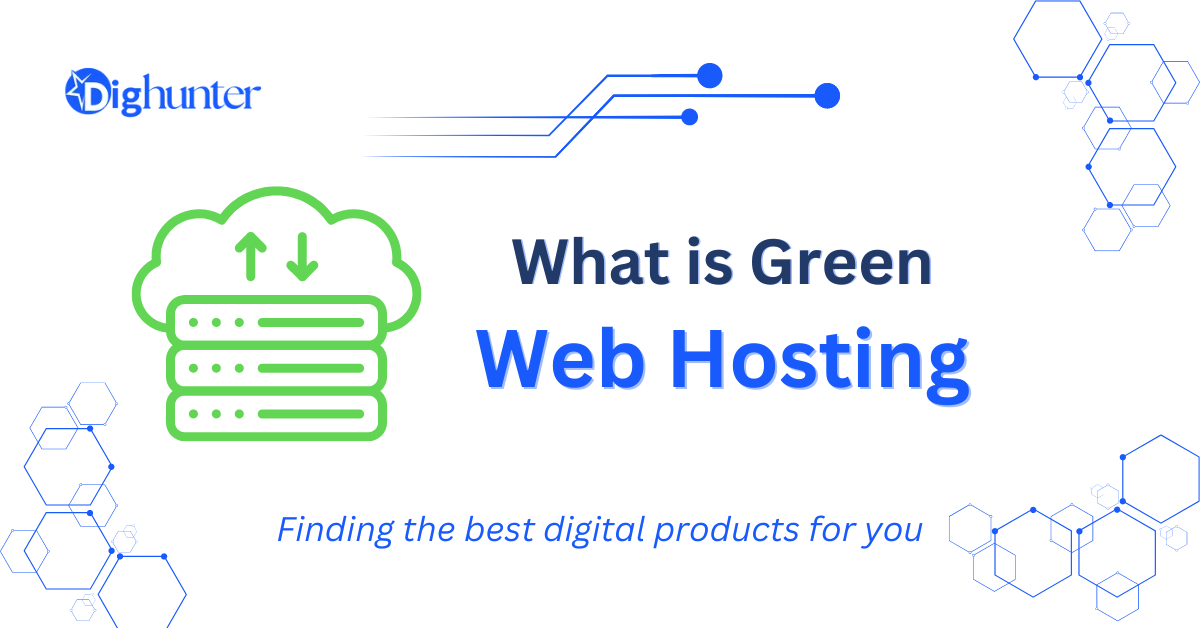Green hosting refers to web hosting services powered by renewable energy sources. It aims to reduce the carbon footprint of data centers.
Green hosting is an environmentally friendly alternative in the web hosting industry. Traditional web hosting relies heavily on fossil fuels, contributing to carbon emissions. In contrast, green hosting utilizes renewable energy sources like wind, solar, and hydro power. This reduces the environmental impact of maintaining servers and data centers.
Many green hosting providers also implement energy-efficient technologies and carbon offset initiatives. By choosing green hosting, businesses and individuals support sustainable practices while ensuring their websites run efficiently. It’s an excellent way to contribute to a greener planet while maintaining a robust online presence.

Credit: www.hostpapa.com
➡️What is Green Hosting?
Green Hosting is an eco-friendly web hosting solution aimed at reducing the environmental impact of traditional web hosting. This innovative approach helps preserve our planet while providing reliable and efficient hosting services. But what exactly is Green Hosting?
Green Hosting refers to web hosting services powered by renewable energy sources. These sources include wind, solar, and hydropower. The goal is to minimize the carbon footprint of hosting servers.
Why Choose Green Hosting?
Choosing Green Hosting helps protect the environment. Traditional web hosting relies on energy-intensive data centers. These centers contribute significantly to carbon emissions. Green Hosting uses renewable energy to power these data centers.
How Does Green Hosting Work?
Green Hosting providers invest in renewable energy projects. They purchase renewable energy credits (RECs) to offset their carbon footprint. Some even build their own solar or wind farms.
| Benefit | Explanation |
|---|---|
| Environmental Impact | Reduces carbon emissions and reliance on fossil fuels. |
| Cost-Effective | Many Green Hosting plans are competitively priced. |
| Brand Image | Enhances your brand’s reputation as eco-friendly. |
Features Of Green Hosting
- Renewable Energy Sources: Utilizes wind, solar, and hydro power.
- Energy Efficiency: Data centers designed to consume less energy.
- Carbon Offsetting: Investments in projects that reduce carbon emissions.
Who Should Use Green Hosting?
Green Hosting is ideal for environmentally conscious individuals and businesses. It benefits anyone who wants to reduce their carbon footprint. It’s a great choice for those who want to support renewable energy initiatives.
➡️Benefits of Green Hosting
Green Hosting, also known as eco-friendly hosting, uses renewable energy sources to power its servers. The benefits of Green Hosting extend beyond just environmental impact. Businesses can also enjoy cost savings and a positive brand image. Let’s explore how Green Hosting can benefit you.
Eco-friendly Impact
Green Hosting significantly reduces the carbon footprint. Traditional hosting relies on fossil fuels, which produce harmful emissions. Green Hosting, on the other hand, uses renewable energy sources like wind, solar, and hydropower.
Here are some key eco-friendly benefits:
- Reduced Greenhouse Gases: Renewable energy sources emit little to no greenhouse gases.
- Energy Efficiency: Green data centers optimize energy use, reducing waste.
- Sustainable Practices: Companies often implement recycling and water-saving measures.
Let’s compare the environmental impact of traditional hosting and Green Hosting:
| Hosting Type | Energy Source | Carbon Emissions |
|---|---|---|
| Traditional Hosting | Fossil Fuels | High |
| Green Hosting | Renewable Energy | Low |
Choosing Green Hosting helps the planet. It also sets a positive example for customers and competitors.
Cost Savings
Green Hosting offers financial benefits. These savings stem from energy efficiency and incentives. Here are some ways Green Hosting saves money:
- Lower Energy Bills: Renewable energy is cheaper in the long run.
- Tax Incentives: Governments offer tax breaks for using renewable energy.
- Reduced Cooling Costs: Efficient data centers need less cooling, saving money.
Consider this cost comparison for a typical business:
| Hosting Type | Monthly Cost | Annual Savings |
|---|---|---|
| Traditional Hosting | $100 | $0 |
| Green Hosting | $80 | $240 |
Switching to Green Hosting can save hundreds of dollars annually. These savings free up funds for other business needs.
Investing in Green Hosting is a win-win. It benefits the environment and saves you money.
➡️Types of Green Web Hosting
Green hosting is an eco-friendly approach to web hosting. It uses renewable energy to power servers and reduce carbon footprints. This type of hosting is important for businesses that care about the environment. Let’s explore the different types of green hosting.
Shared Hosting
Shared hosting is one of the most popular types of green hosting. In this setup, multiple websites share a single server. This sharing helps reduce energy consumption and carbon emissions. It is also cost-effective, making it a good choice for small businesses and personal websites.
Key features of green shared hosting:
- Lower Costs: Shared resources mean lower prices.
- Eco-Friendly: Uses renewable energy sources.
- Managed Services: Hosting provider handles maintenance.
- User-Friendly: Easy to set up and use.
Advantages:
- Affordable
- Low maintenance
- Environmentally friendly
Disadvantages:
- Limited resources
- Performance can be affected by other sites
Shared hosting is ideal for those starting out. It offers a balance of cost and environmental benefits.
VPS Hosting
VPS hosting stands for Virtual Private Server hosting. It offers more resources than shared hosting but still maintains eco-friendliness. In VPS hosting, a physical server is divided into multiple virtual servers. Each virtual server operates independently.
Key features of green VPS hosting:
- Scalability: Easily upgrade resources as needed.
- Better Performance: More resources compared to shared hosting.
- Customization: Greater control over server settings.
- Environmentally Friendly: Uses renewable energy.
Advantages:
- Better performance
- More control
- Scalable
Disadvantages:
- Higher cost than shared hosting
- Requires some technical knowledge
VPS hosting is suitable for growing businesses. It provides more power and control while still being eco-friendly.
Dedicated Hosting
Dedicated hosting offers the highest level of performance and resources. In this type, a single server is dedicated to one website or business. This setup ensures maximum speed and reliability. Green dedicated hosting uses renewable energy to power these servers.
Key features of green dedicated hosting:
- Maximum Performance: Full resources of the server.
- High Reliability: No sharing with other sites.
- Complete Control: Full access to server settings.
- Eco-Friendly: Powered by renewable energy.
Advantages:
- Top performance
- High reliability
- Full control
Disadvantages:
- Expensive
- Requires technical expertise
Dedicated hosting is perfect for large businesses. It offers unmatched performance and control with an eco-friendly approach.
➡️Renewable Energy Sources
Green hosting is an eco-friendly alternative to traditional web hosting. It uses renewable energy sources to power data centers. These sources include solar power and wind energy. This reduces the carbon footprint and helps save the environment. Let’s dive into these renewable energy sources.
Solar Power
Solar power is one of the most popular renewable energy sources. It uses sunlight to generate electricity. Solar panels capture sunlight and convert it into energy. This energy powers data centers and servers.
Solar power offers many benefits:
- Environmentally friendly: Solar energy does not produce harmful emissions.
- Cost-effective: After the initial investment, solar energy is free.
- Reliable: Solar panels can work for many years with minimal maintenance.
Many green hosting companies use solar power. They install solar panels on the roofs of their data centers. This reduces their reliance on fossil fuels. Some companies even generate extra energy. They sell this back to the grid, helping to power homes and businesses.
Here’s a quick look at the benefits of solar power:
| Benefit | Description |
|---|---|
| Zero Emissions | No harmful gases released. |
| Low Costs | Free energy after setup. |
| Long Lifespan | Panels last many years. |
Wind Energy
Wind energy is another crucial renewable source. It harnesses the power of the wind to generate electricity. Wind turbines capture wind and convert it into usable energy. This energy then powers the data centers.
Wind energy offers several advantages:
- Clean energy: Wind turbines do not produce any pollutants.
- Abundant: Wind is a plentiful resource available in many areas.
- Economical: Wind energy reduces electricity costs over time.
Many green hosting providers use wind energy. They place wind turbines in windy locations. This ensures a steady supply of power. Some companies even use a combination of wind and solar energy. This maximizes their energy efficiency and sustainability.
Here’s a summary of the benefits of wind energy:
| Benefit | Description |
|---|---|
| Pollution-free | No harmful emissions. |
| Resourceful | Wind is widely available. |
| Cost Savings | Reduces electricity expenses. |
➡️Certifications and Standards
Green hosting is a sustainable approach to web hosting that reduces environmental impact. Hosting companies achieve this by using renewable energy sources and implementing efficient technologies. Certifications and standards help identify and validate the green practices of these hosting providers. Below are some key certifications and standards to look for in green hosting.
Energy Star
Energy Star is a widely recognized certification that signifies energy efficiency. It is awarded by the Environmental Protection Agency (EPA) in the United States. Hosting providers with this certification use energy-efficient servers and data centers. This helps reduce their carbon footprint.
Benefits of Energy Star Certification:
- Reduces energy consumption
- Lowers operational costs
- Decreases greenhouse gas emissions
Energy Star-certified data centers often include:
| Feature | Description |
|---|---|
| Efficient Cooling Systems | Reduces energy needed to cool servers |
| Advanced Power Management | Optimizes power usage |
| Renewable Energy Sources | Uses solar or wind energy |
Choosing an Energy Star-certified hosting provider is a step towards a greener internet. It ensures that your website operates sustainably.
Green Seal
Green Seal is another important certification. It focuses on environmental standards and sustainability. This certification evaluates the entire lifecycle of products and services. Hosting providers with Green Seal certification adhere to strict environmental guidelines.
Benefits of Green Seal Certification:
- Promotes sustainable practices
- Ensures eco-friendly operations
- Supports responsible resource use
Green Seal-certified providers often implement:
| Practice | Impact |
|---|---|
| Renewable Energy Use | Reduces reliance on fossil fuels |
| Waste Reduction Programs | Minimizes electronic waste |
| Water Conservation | Optimizes water use in cooling systems |
Choosing a hosting provider with Green Seal certification ensures that your website supports sustainable practices. It also helps reduce your environmental impact.
➡️Choosing a Green Host
Choosing a green host is a crucial step towards reducing your website’s carbon footprint. Green hosting providers use renewable energy sources, energy-efficient technologies, and eco-friendly practices. This guide will help you identify the best green hosting options for your needs.
Key Features
When selecting a green host, look for specific features that ensure sustainability and performance:
- Renewable Energy Certificates (RECs): These certificates prove that the host uses renewable energy sources like wind, solar, or hydropower.
- Energy-Efficient Servers: Opt for hosts that use servers designed to consume less power and generate less heat.
- Carbon Offsetting: Some hosts offset their carbon emissions by investing in environmental projects.
- Data Center Location: Choose hosts with data centers in regions with cooler climates to reduce cooling energy.
- Eco-Friendly Practices: Look for companies that practice recycling, reduce e-waste, and promote digital sustainability.
| Feature | Description |
|---|---|
| Renewable Energy Certificates | Proof of using renewable energy sources. |
| Energy-Efficient Servers | Servers that consume less power. |
| Carbon Offsetting | Investing in projects to offset carbon emissions. |
| Data Center Location | Choosing cooler climates for data centers. |
| Eco-Friendly Practices | Practices like recycling and reducing e-waste. |
Reputation and Reviews
Reputation and reviews are essential indicators of a green host’s reliability:
Customer Reviews: Check independent review sites for customer feedback. Look for comments on uptime, support, and sustainability practices.
Industry Awards: Recognitions from reputable organizations can indicate the host’s commitment to green practices. Awards in sustainability are a good sign.
Case Studies: Some hosts publish case studies showcasing their green initiatives and their impact. These provide insights into their actual practices.
Social Proof: High-profile clients and partnerships with environmental organizations add credibility. These partnerships often highlight a host’s dedication to sustainability.
- Customer Reviews: Real user feedback on performance and sustainability.
- Industry Awards: Recognition from reputable bodies.
- Case Studies: Detailed examples of green initiatives.
- Social Proof: High-profile clients and partnerships.
To make an informed decision, consider these aspects and choose a host that aligns with your green values and performance expectations.
➡️Challenges in Green Hosting
Green hosting is a way to host websites using renewable energy. It helps to reduce the carbon footprint of online activities. Though it is beneficial for the environment, it comes with some challenges. Understanding these challenges is crucial for both providers and users.
Cost Implications
One of the main challenges in green hosting is the cost implications. Green hosting often requires significant upfront investments. These costs can be broken down into various categories:
- Infrastructure Costs: Setting up solar panels or wind turbines is expensive.
- Maintenance Costs: Renewable energy systems need regular maintenance.
- Energy Storage: Batteries for storing renewable energy add to the cost.
Here is a comparison of traditional and green hosting costs:
| Type of Hosting | Setup Cost | Maintenance Cost | Energy Cost |
|---|---|---|---|
| Traditional Hosting | $5,000 | $500/year | $1,000/year |
| Green Hosting | $10,000 | $1,000/year | $500/year |
Though the initial costs are higher, green hosting can save money in the long run. The lower energy costs and potential government incentives can help offset the initial investments. Providers need to educate consumers about these long-term benefits.
Consumer Awareness
Another challenge is the lack of consumer awareness. Many people do not know about green hosting or its benefits. This lack of knowledge affects their choices:
- Limited Information: Consumers often do not have access to detailed information about green hosting.
- Misconceptions: Some think green hosting is less reliable than traditional hosting.
- Marketing Gaps: Providers may not effectively market their green hosting services.
To address these issues, educational campaigns are essential. These campaigns can include:
- Informative Blogs and Articles
- Social Media Campaigns
- Webinars and Workshops
Providers can also use certifications and badges to assure consumers of their eco-friendly practices. This can build trust and make green hosting more appealing. By increasing consumer awareness, the adoption of green hosting can grow.

Credit: www.amazee.io
➡️Future of Green Hosting
Green Hosting is the future of the web. As awareness about climate change grows, more businesses and individuals are switching to eco-friendly hosting solutions. This shift helps reduce the carbon footprint of online activities. The future of green hosting looks promising with new technologies and market trends making it more accessible and efficient.
Emerging Technologies
New technologies are driving the future of green hosting. These innovations make hosting more efficient and eco-friendly.
Renewable Energy: Data centers are now using solar and wind energy. This reduces reliance on fossil fuels.
- Solar panels on rooftops
- Wind turbines near data centers
Energy-Efficient Hardware: Modern servers use less power. They are designed to be more efficient.
- Low-power processors
- Efficient cooling systems
Virtualization: Virtual servers use fewer resources. They allow multiple websites to share the same physical server.
- Reduces the number of physical servers needed
- Less energy consumption
These technologies make green hosting more sustainable. They also lower costs for hosting providers and customers.
Market Trends
The market trends in green hosting are evolving. More companies are adopting green hosting solutions.
Increased Demand: More customers want eco-friendly hosting. This demand drives the market forward.
- Businesses seeking green credentials
- Consumers prefer sustainable brands
Competitive Pricing: Green hosting is becoming more affordable. Prices are dropping due to technological advancements.
- Cost of renewable energy is decreasing
- Energy-efficient hardware is cheaper to operate
Government Regulations: New laws support green hosting. Governments encourage the use of renewable energy.
- Subsidies for green energy projects
- Incentives for using renewable energy
These trends show a bright future for green hosting. As demand rises and costs fall, green hosting will become the norm.
➡️In a nutshell
Green hosting is not just a trend; it’s a necessity for the environment. Choosing eco-friendly hosting solutions helps reduce carbon footprints and supports sustainable practices. This final section will summarize the key points about green hosting, encouraging you to make an informed decision.
Green hosting uses renewable energy sources to power data centers. This reduces the dependence on fossil fuels. Hosting providers often participate in carbon offset programs, further reducing environmental impact. Here’s a quick look at the benefits:
- Reduced carbon footprint: Lower greenhouse gas emissions.
- Renewable energy: Solar, wind, or hydroelectric power sources.
- Sustainability: Long-term environmental benefits.
- Corporate Responsibility: Enhances brand image and customer trust.
How To Choose A Green Hosting Provider
Not all green hosting providers are the same. Look for certifications and partnerships with environmental organizations. Check if they use renewable energy sources. Here are some factors to consider:
| Criteria | Description |
|---|---|
| Certifications | Look for Green-e or similar certifications. |
| Energy Sources | Check if they use 100% renewable energy. |
| Carbon Offsets | Providers should invest in carbon offset projects. |
Cost-effectiveness
Many think green hosting is expensive. The truth is, it can be cost-effective. Renewable energy costs are decreasing. Green hosting providers often offer competitive pricing. Here are some cost-related benefits:
- Lower operational costs: Renewable energy can be cheaper in the long run.
- Incentives and rebates: Some regions offer financial incentives for using green energy.
- Customer loyalty: Environmentally-conscious customers prefer green businesses.
Final Takeaway
Green hosting offers numerous benefits. It supports sustainability and reduces environmental impact. Choosing a green hosting provider can enhance your brand image. It’s a cost-effective solution with long-term benefits. Make the switch to green hosting today!
➡️Frequently Asked Questions
- What Is Green Hosting?
Green hosting uses renewable energy to power web servers. It reduces carbon footprints and promotes environmental sustainability.
- Why Choose Green Hosting?
Choosing green hosting helps combat climate change. It supports renewable energy and demonstrates corporate social responsibility.
- How Does Green Hosting Work?
Green hosting utilizes eco-friendly technologies. These include renewable energy sources like wind and solar power for data centers.
- Is Green Hosting More Expensive?
Green hosting costs are competitive. Many providers offer affordable plans without compromising on sustainability and performance.
➡️Final Thought
Choosing green hosting benefits both your website and the environment. It reduces carbon footprints and saves energy. By opting for eco-friendly hosting, you’re supporting a sustainable future. Make the switch to green hosting today and contribute to a healthier planet.
Your website will thank you, and so will the Earth.




